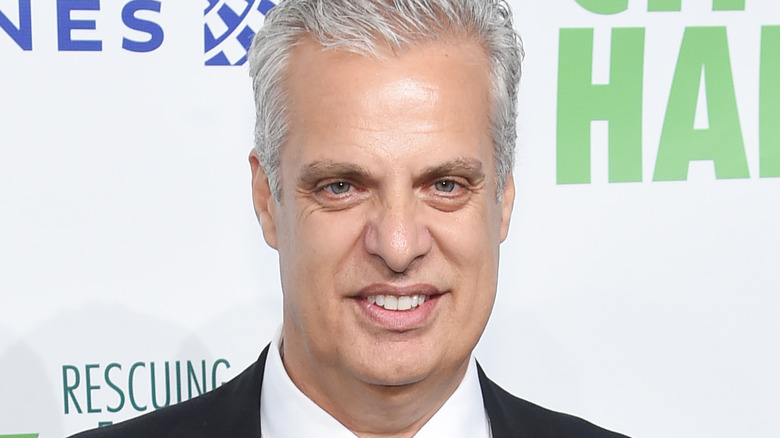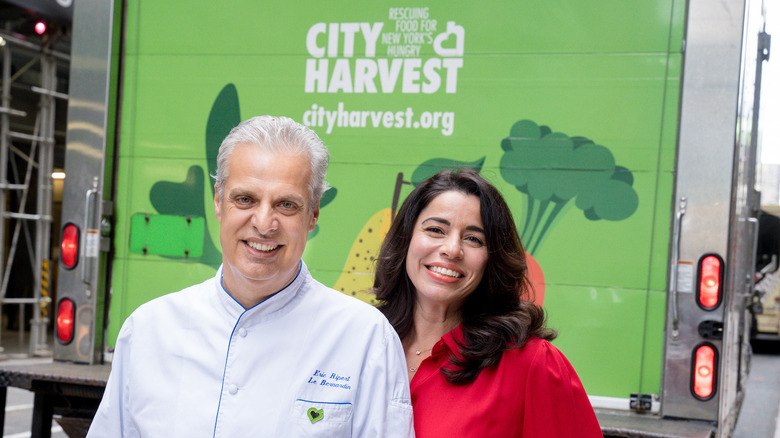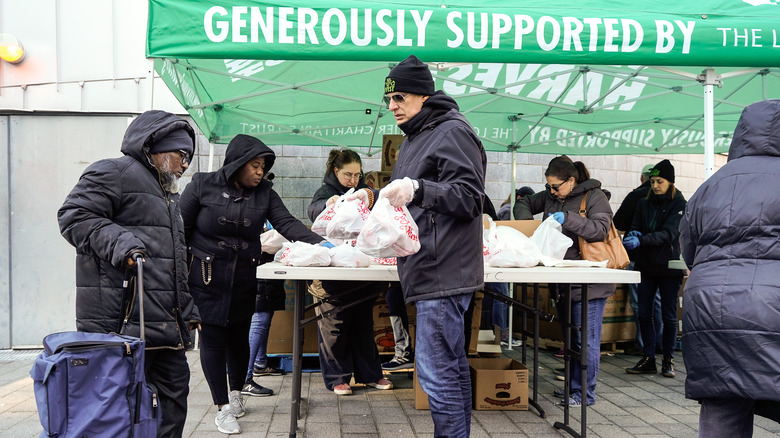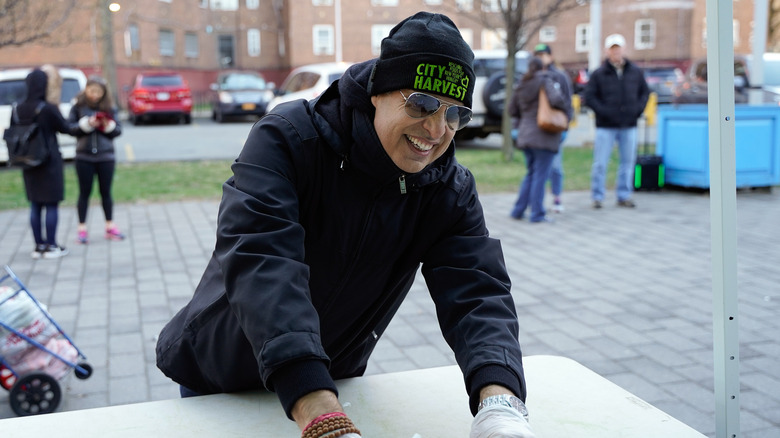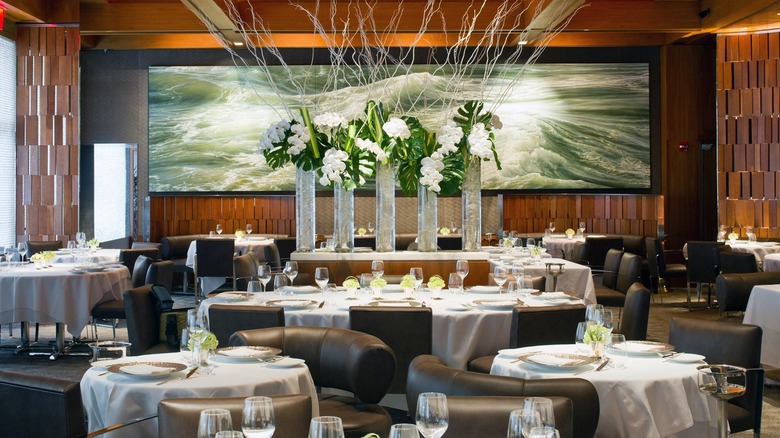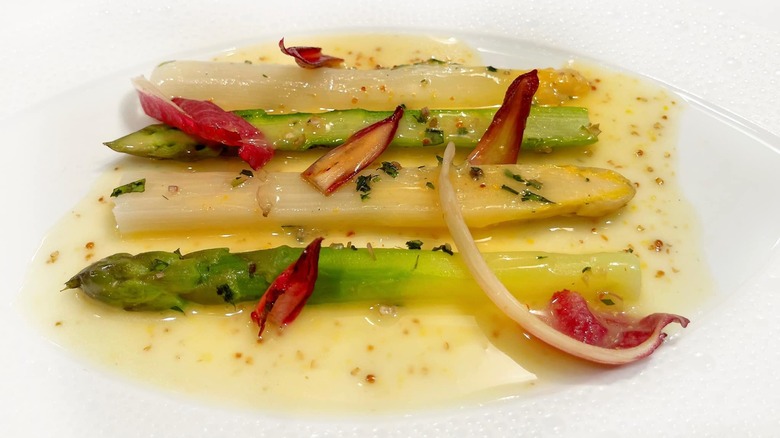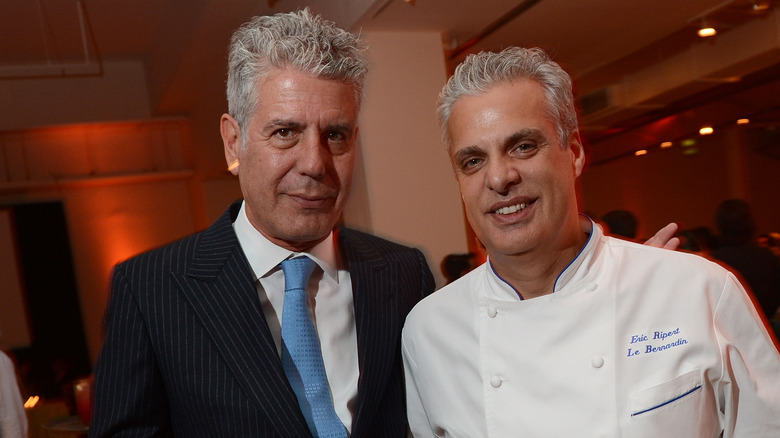Eric Ripert Fights Hunger And Poverty With The City Harvest Gala - Exclusive Interview
You probably know Chef Eric Ripert from his appearances on Food Network, his prestigious New York City restaurant Le Bernardin, or even his long-standing friendship with Anthony Bourdain. However, you might not have known that the award winning modernist French chef is also deeply passionate about giving back to the community, and in big ways. He's been involved with NYC's largest food rescue organization, City Harvest, for 25 years, as a volunteer, leader, and eventually vice chair of the board.
Ripert, along with his wife, are now being honored for their passionate service at this year's City Harvest Gala, which says it is "thrilled to recognize and thank both Sandra and Eric Ripert for being such committed members of the City Harvest family." The organization says "their dedication to feeding New York City is unmatched," adding that particularly "throughout the COVID-19 pandemic, Eric and Sandra have supported City Harvest in tremendous ways, helping the organization to ramp up its operations to rescue and deliver more food than ever before."
Mashed recently spoke exclusively with Ripert about his work with City Harvest and his passion for feeding people during the pandemic and beyond. He also reflected on the legacy of Le Bernardin (and shared his favorite dish on the menu), explained his recent affinity for fresh vegetables, and opened up about his friendship with Anthony Bourdain.
Chef Eric Ripert has been helping fight hunger with City Harvest for 25 years
What does it mean for you and your wife to be honored by City Harvest at this year's gala?
When you are honored, you don't take that for granted, because a lot of people have thought that you have done pretty well for something that is very worth it. I'm honored and humbled by that. It's also a great encouragement to do better next year.
[Can you] talk more about City Harvest and the work that you've done with this organization over the last 25 years?
I started to work with City Harvest in 1997, and it has been a work in progress since. I started with them by giving food every day to the drivers, and then I became more involved and I became the President of the Food Council ... for City Harvest ... the group of chefs in New York who are helping City Harvest by giving food, by going to events, and by bringing attention, raising money through auctions and so on. [I've had] that position for a long time. I became a board member and then I became the vice chair of the board. We still raise money, still give food, still raise attention and so on for City Harvest.
You and your wife have mentioned in the past that this cause is very personal to you, both. Why is City Harvest so important to you?
My wife was born in Brooklyn, in a Puerto Rican family, and they were very humble. They were depending on help for food. In between food stamps and some help, they were basically fighting hunger. That is very personal.
For myself, it's a bit different. I have never been in that situation ... [but] I also live in New York, which is the capital of the world in terms of many things, including finance. We cannot accept to have part of the community being wealthy and living very well, and having some people in the same city that are struggling with food. Therefore, it inspired me to really make a difference. City Harvest is the best organization and the biggest food rescue organization in New York, and I'm honored to be able to give back, thanks to them.
Food insecurity is more common in America than you may think
You mentioned this — when we think of food rescue organizations, I feel like it's often in the context of disaster relief efforts or a third world country, but what do you think more Americans should understand about food insecurity right here in the United States?
I can take New York as a big example because [City Harvest is based here]. In New York, you have 1.5 million people living under poverty level. What defines the poverty level is that you make [around] $28,000 a year and you have a family to feed. 1.5 million people are like that in New York, and all over the U.S., we have people who are facing the same challenges. Unfortunately, they don't even have the help that City Harvest [provides] for New Yorkers in need.
The work of City Harvest is essential for a big city like that. You [may] have people very close to [you] that are hungry, and it's very difficult to see. People do not advertise that they don't have food on the table, but malnutrition and people fighting hunger is common in America. Very common.
Chef Eric Ripert also helped fight hunger in New York during the pandemic
The issue of food insecurity has certainly been magnified in many ways since the pandemic. You stepped up in a big way right from the start. The day after you closed Le Bernardin, you were making meals for the community and supporting front line workers with City Harvest. Can you talk a little bit about what that was like, and how the restaurant and your role as a chef evolved during this moment?
To give you the big picture, City Harvest in 2019 was giving about 90 million pounds of food. During the pandemic, City Harvest decided to [give] much more and put a lot of effort, and City Harvest gave 250 million pounds of food.
What an incredible effort.
When we closed the restaurant, the day after, I went to a mobile market. Mobile markets are in the five boroughs, and City Harvest basically distributes fruits and vegetables to people in need twice a week. [People] come and they pick and choose, and that way they can cook at home whatever they wish. I went there right away because I wanted to inspire people to do something and not be paralyzed by the pandemic.
The restaurant closed in March. Starting in May, we started to do 400 meals out of the restaurant. It was a partnership between City Harvest and the organization of José Andrés' World Central Kitchen. We were getting the food from City Harvest, we were cooking, and World Central Kitchen was bringing the food to shelters. We did that from May to December.
As a chef, where is your mindset in all of this?
During the time when we were closed, I was very worried about making sure that we would be able to reopen the restaurant. That was a major concern of mine, but I was also very worried about the community because it was such a big need. We decided to cook those 400 meals a day, [every day from May to December].
If you go on my Instagram, you can see World Central Kitchen icons, and we have all the meals that we did every day from May until December when we stopped. They were delicious meals, nutritious meals, meals that you would eat in a restaurant. We were very proud of cooking amazing food for shelters. That was the food that we were eating ourselves for lunch.
The legacy of Le Bernardin
Your restaurant, Le Bernardin, is undoubtedly a culinary institution, holding three Michelin stars for nearly 20 years. What does that legacy mean to you today?
It's amazing to be recognized. It's a great encouragement to the team. It's a great motivation to the team and myself. When we get our wealth like that and we get recognized, we don't take it for granted. We celebrate, actually, and when we have criticism, we take them very seriously and address it very quickly to make sure that we deliver an experience that is amazing to our clientele, because it makes us happy to make you happy.
I'm going to put you on the spot. What are some of your favorite dishes on the menu, or the ones you're the most proud of?
It's like asking a father which one is your favorite child? It's very difficult, and also, we change a lot of the menu all the time. I will say the carpaccio tuna that we have is one of my favorites and [it's been on] the menu for a long time. My favorite dish today ... is inspired by the spring, although today is very cold in New York. If you would have asked me in December, it would have been something very different. If you ask me in August, it would probably be very summery.
Eric Ripert on turning his focus from seafood to vegetables
Your latest cookbook, Vegetable Simple, is somewhat of a departure from your background, which has been so heavily focused on seafood in particular. What inspired you to turn your focus to vegetables?
I eat a lot of vegetables when I am not at the restaurant. [While I'm there], I eat a lot of seafood. Very little meat, but I eat meat as well. When I entertain in the summer or when I entertain during the good season when we have beautiful vegetables and fruits, I go to the farmers markets or the farm stand and I buy a lot of vegetables. Then, I bring them home and I create a lot of different, I would say, small dishes, and we invite friends and neighbors and we put the dishes in the middle of the table. Our meals are mainly vegetarian. It's very convenient because everybody's passing the plates to the other, and we have those great delicious meals that are really inspired by the season. That was one of the inspirations for the book.
I'm also always thinking about the wellbeing of the planet, the wellbeing of earth — human beings and animals as well — and I thought creating this book will also help in some ways to improve our health and improve what's happening on the planet. We're talking about pollution and we're talking about animal suffering and so on, and the book is a little bit of all of that.
Do you think that veggies are underappreciated in the food community?
I believe they have been. They were basically like a second or third thought, but lately it's a trend that I believe will not disappear or die, of basically highlighting vegetables.
Can you share some of your best tips or tricks for making vegetables the star of a dish rather than just the side?
You have to buy vegetables that are in season, because they are at their best, and then buy whatever inspires you. If you're a good cook, you will probably know how to prepare them. If you're not, try to choose some recipes that are simple. I'm not [just] promoting my book, but "Vegetable Simple" could help you. Whoever has a good recipe for you to cook simple will ultimately elevate the vegetables, because the more you put in your vegetables, the more you lose the flavors and textures and the delicacy of those vegetables.
Friendship with Anthony Bourdain and favorite foods
I'd love to ask you about your dear friend and fellow chef, Anthony Bourdain. We still continue to learn more about him and about his tremendous impact on the culinary world and beyond. What stands out to you now, when you look back on your friendship with him?
I met Anthony when "Kitchen Confidential" came out, and then the friendship was almost immediate. We became friends very quickly and we had a very special relationship, although we were very different. Anthony was a little bit of a pirate and I was more like a French chef, but we had a good dynamic and we had a lot of great times together, and it was based on respect and loyalty. We traveled quite a bit for television or for other occasions, including for pleasure. We were very close and different.
How would you describe Bourdain's legacy to the culinary world?
Anthony's legacy is not only to the culinary world, it's to [the entire] world. It changed the way we think about food, but it also changed journalism. It changed the way you do television, and so on. He had a huge impact with his shows and with his writing and on the way we think about food.
He was also [an inspiration] to travel and to discover new cultures, be humble and curious, and learn through those experiences — discover cultures through eating. This is basically one of the biggest legacies of Anthony.
Who is one chef that you would love to have cook you dinner?
What's your favorite comfort food?
It depends on the season, but I love braised meats or stews with vegetables and things like that.
What is one ingredient you cannot live without?
Salt. Without salt, the food is bland. Sorry.
You can learn more about City Harvest on their website. If you want to show more support, click here to make a donation to help feed people in need.
